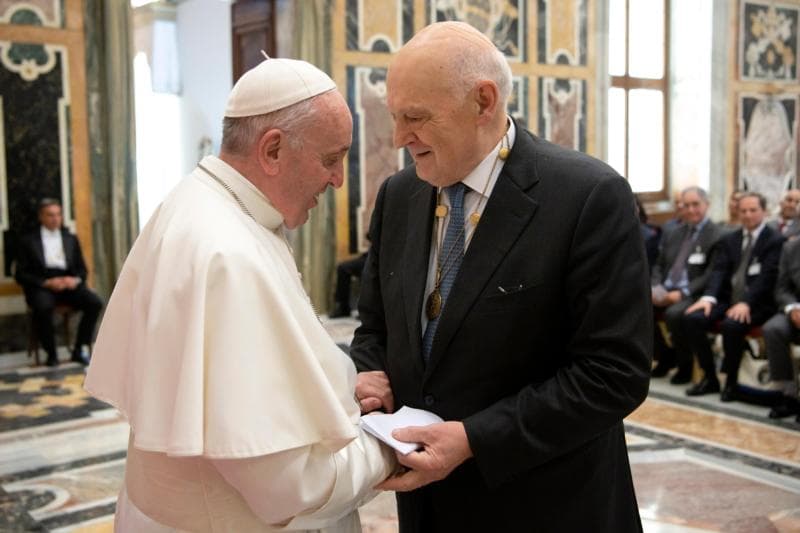ROME – A top Vatican advisor on economic and social issues has challenged the effectiveness of the European Union over its handling of the COVID-19 coronavirus outbreak.
In a roundtable with journalists April 14, Italian economist Stefano Zamagni called for the European Union to become more powerful, so that it has the ability to force member states to offer mutual support in times of crisis.
Zamagni, a professor at the University of Bologna, is the current President of the Pontifical Academy of Social Sciences, and one of the highest ranking laymen at the Vatican.
“One thing this pandemic makes us understand is that this European Union model is not good. It’s fine for ordinary things…but not when extraordinary phenomena happen,” Zamagni said during the roundtable, which focused on recent article he wrote, titled, “The four lessons of the crisis: What does the terrible situation we are experiencing teach us?”
Speaking of the European coronavirus outbreak, Zamagni said the crisis has demonstrated Europe’s “impotence” in handling major catastrophes, as did the 2008 economic crisis.
Europe, he argued, “doesn’t have a parliament. One can say, ‘it’s not true!’ Sure, on paper yes,” but paper, he said, means nothing because there is “no action.”
“The European Parliament is limited to giving advice, to promoting motions which are almost never realized,” he said. “If we want to believe in the principle of democracy, we must understand that government guidelines are needed, and for the government to do them, (but) this is not there, because save very few cases, parliament doesn’t have the power or direct control to direct the European Commission.”
Though member states of the E.U. are bound by treaties, these agreements have the juridical nature “of a contract,” Zamagni said, adding that “the language is the same.”
“There is no need to be an expert in the economy to know the difference,” he said, explaining that in the market, “if I wish to sell my house, of course I will look for an adequate price for mine, as you would for yours…But when this logic is applied among governments, what comes out is what we’re seeing.”
He pointed to several European countries, specifically Germany and the Netherlands, who refuse to go above a certain limit in crisis funding for other European countries severely impacted by COVID-19, including Spain and Italy.
“This is of course unacceptable. You can’t speak of a European Union. Where is the union? There isn’t a union, there is only a convergence of interests” on certain issues, Zamagni said, noting that there is also no common foreign policy in the E.U., no common welfare models for handling debt, and no common approach to dealing with the migrant influx into Europe.
“How can you speak of a European foreign policy when each one has their own, often at odds with those of others?” he asked, and pointing to different migration policies among E.U. members, said “this is why Mediterranean countries such as Italy and Spain pay a price that Nordic countries don’t pay.”
As a solution, Zamagni proposed a dramatic return to “the origins” of the European Union after the Second World War.
The 1957 Treaty of Rome signed by the founding the European Community, which became the European Union in 1992, said that, “the first element of European vitality must be solidarity.”
“Europe today needs a ‘soul supplement,’” Zamagni said. “We must return to valuing the fundamental principles of a community,” meaning a sense in which one is responsible for the other.
Pope Francis himself has often advocated for a return to Europe’s roots, most recently in his April 12 Easter Urbi et Orbi address, during which he pointed to the wave of solidarity that swept through Europe post-World War II, saying the current pandemic “is not a time for self-centeredness, because the challenge we are facing is shared by all, without distinguishing between persons.”
RELATED: On an Easter under quarantine, Pope calls resurrection a ‘contagion of hope’
Noting that the European Union now finds itself in the midst of a massive crisis, the pope said it is more urgent than ever that “these rivalries do not regain force, but that all recognize themselves as part of a single family and support one another.”
In his roundtable, Zamagni also backed several proposals from the pope during his Easter speeches to curb the economic impact of the coronavirus, including a temporary universal basic income for those who have lost their jobs, and the moratorium or cancellation of debt owed by poor countries.
“Poor countries risk a pandemic that can cause disastrous effects; they don’t have the healthcare structures that the West does,” he said, adding that the pope’s proposal “can be a solution, which I personally favor.”
It seems that so far at least one European leader, French President Emmanuel Macron, has taken the pope’s proposal to heart, stating Monday, April 13 – the day after Francis made his proposal – that Europe should assist Africa, in particular, with the coronavirus by “massively canceling its debt.”
Zamagni in his comments also urged a global re-education in the virtue of prudence, as well as the practice of subsidiarity, with governments depending on NGOs and other organizations on the ground that best know the needs of their local communities.
He also encouraged the establishment of a government-appointed working group made up of competent and non-partisan individuals to begin drafting a national revival plan, taking into account not only a person’s access to healthcare, which he said has become too institutionalized, but which also helps guarantee health on the level of lifestyle, working conditions, the environment and the family.
Follow Elise Ann Allen on Twitter: @eliseannallen














